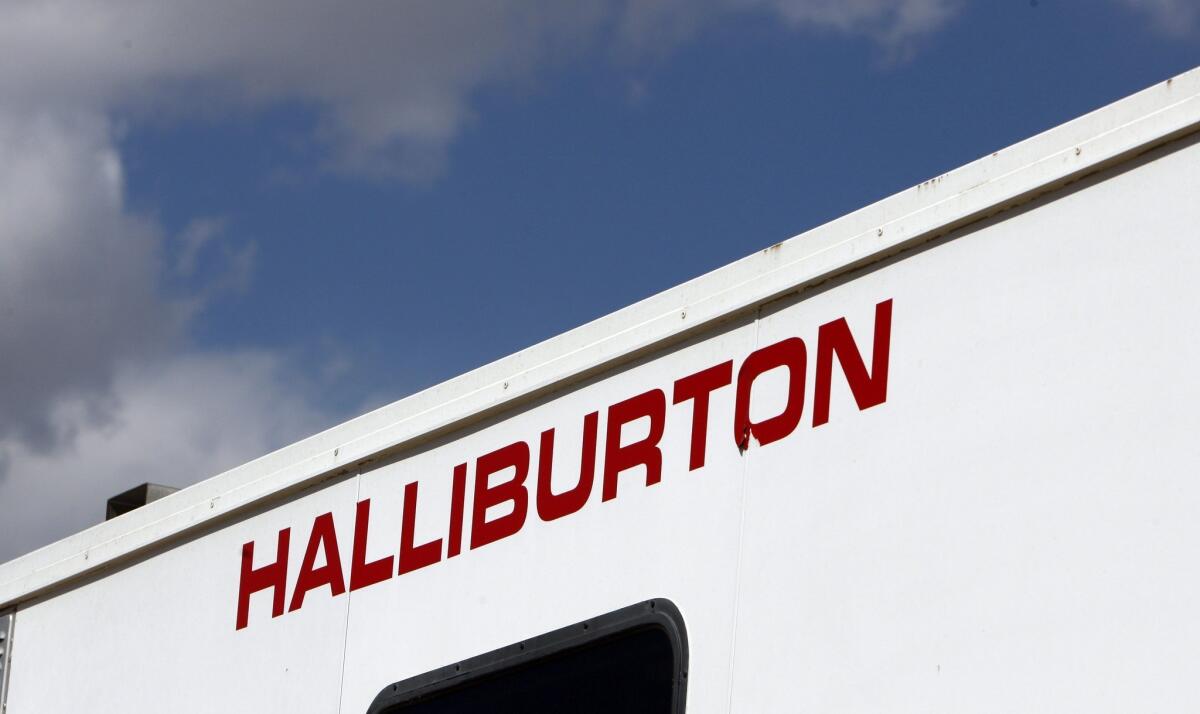Supreme Court is unlikely to halt class-action stock fraud lawsuits

- Share via
WASHINGTON — Halliburton Co. and other U.S. corporations urged the Supreme Court to reverse a 26-year-old ruling that triggered an avalanche of class-action lawsuits by investors in publicly traded companies.
But based on justices’ comments Wednesday, it appeared they would fall at least one vote short of a major victory.
Chief Justice John G. Roberts Jr. and Justice Anthony M. Kennedy explored the idea of a “midway” ruling that would make it slightly harder, but not impossible, to bring such suits.
They suggested the court could require a lawyer filing a suit for a group of investors to show evidence that the company’s misleading statements caused its stock price to inflate.
The Supreme Court opened the door for most of today’s class-action stock fraud suits in 1988 when it ruled that a class of plaintiffs need not show they were fooled by a company’s false statements.
Instead, the court said these misleading claims were, in effect, built into the stock price, so any buyer of the stock was a victim of fraud. This became known as the “fraud on the market” theory.
For example, if investors bought the stock of a drug company that had recently reported promising new test results for one of its drugs, the price they paid no doubt reflected those reports.
However, if the price fell sharply a year later after new test results contradicted the earlier reports, the investors might well think they — as well as the market —were fooled and defrauded.
An attorney for Halliburton, the Texas energy company once led by former Vice President Dick Cheney, urged the court to block most of the costly, class-action lawsuits by requiring proof that individual investors had read and were fooled by the company’s misleading statements.
The law should demand “actual eyeball reliance,” Houston lawyer Aaron Streett told the justices.
But attorneys for investors complained such a standard would pose an impossibly high hurdle because most investors, and even investment advisors, do not claim they read all of a company’s detailed disclosures before they buy the stock.
New York lawyer David Boies, representing investors in a long-running suit against Halliburton, urged the court to stand by the “fraud on the market” rule. “This is something that is embedded in the law,” he said.
Halliburton was sued in 2002 for allegedly concealing its liabilities for asbestos products. When those liabilities came to light, the stock price plunged and investors sued. The suit has gone back and forth in the courts. Last year, the U.S. 5th Circuit Court of Appeals in New Orleans said the suit can go forward as a class-action claim.
Four of the court’s conservatives had hinted in recent years they were open to making a major change in the law. They said they were put off by reports of a steady rise in class-action stock fraud suits that resulted in settlements, which mostly enriched the plaintiffs’ lawyers.
Fewer than 1% of these suits ever go to trial, the court was told.
“Once you get the class certified, the case is over. Right?” Justice Antonin Scalia said. At that point, the company usually offers to pay a settlement, rather than risk a crippling jury verdict.
For that reason, the justices have focused on the rules for certifying a class. Corporate advocates had hoped the business-friendly court would be ready to set a high bar to all such claims.
Since Roberts became chief justice, the court’s conservative bloc has handed down a series of rulings to limit class-action lawsuits. At the same time, however, Roberts and Kennedy have been wary of overturning major precedents in federal law.
To highlight the point, Justice Elena Kagan noted that Congress has revised the stock fraud laws several times since 1988 without scrapping the “fraud on the market” rule.
More to Read
Inside the business of entertainment
The Wide Shot brings you news, analysis and insights on everything from streaming wars to production — and what it all means for the future.
You may occasionally receive promotional content from the Los Angeles Times.











